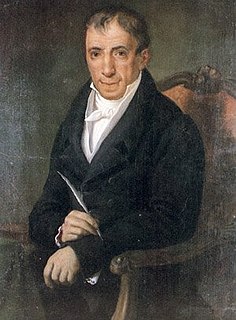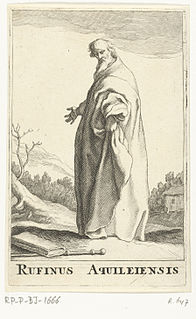
The extant manuscripts of the book Antiquities of the Jews, written by the first-century Jewish historian Flavius Josephus around 93–94 AD, contain two references to Jesus of Nazareth and one reference to John the Baptist.

Origen of Alexandria, also known as Origen Adamantius, was an early Christian scholar, ascetic, and theologian who was born and spent the first half of his career in Alexandria. He was a prolific writer who wrote roughly 2,000 treatises in multiple branches of theology, including textual criticism, biblical exegesis and hermeneutics, homiletics, and spirituality. He was one of the most influential and controversial figures in early Christian theology, apologetics, and asceticism. He has been described as "the greatest genius the early church ever produced".

Ebionites as a term refers to a Jewish Christian sect, which viewed poverty as a path to holiness, that existed during the early centuries of the Common Era. The Ebionites embraced an adoptionist Christology, thus understanding Jesus of Nazareth as a mere man who, by virtue of his righteousness in following the Law of Moses, was chosen by God to be the messianic "prophet like Moses". A majority of the Ebionites rejected as heresies the Orthodox Christian beliefs in Jesus's divinity and virgin birth, and therefore maintained that Jesus was the natural son of Joseph and Mary who was spiritually anointed as the Son of God at his baptism.
Several notable persons of the ancient world were named Antipater, Antipatros :
Apocatastasis comes from the Greek word ἀποκατάστασις (apokatástasis) which means reconstitution or restitution. Acts 3:21 speaks of apocatastasis of all things, and although this passage of the Bible is usually not understood to teach universal salvation, the word apocatastasis is typically used to refer to the belief that everyone – including the damned in hell and the devil – will ultimately be saved. In this sense, it is a form of Christian universalism.

Adamantios Korais or Koraïs was a Greek scholar credited with laying the foundations of modern Greek literature and a major figure in the Greek Enlightenment. His activities paved the way for the Greek War of Independence and the emergence of a purified form of the Greek language, known as Katharevousa. Encyclopædia Britannica asserts that "his influence on the modern Greek language and culture has been compared to that of Dante on Italian and Martin Luther on German".
Apollonius is a masculine given name which may refer to:

Tyrannius Rufinus, also called Rufinus of Aquileia or Rufinus of Concordia (344/345–411), was a monk, historian, and theologian. He is best known as a translator of Greek patristic material, especially the work of Origen, into Latin.
In Christian theology, universal reconciliation is the doctrine that all sinful and alienated human souls—because of divine love and mercy—will ultimately be reconciled to God. The doctrine has been rejected by most mainstream Christian churches, which tend to maintain at least the possibility that many are not saved, but it has received support from many prestigious Christian thinkers as well as many groups of Christians. It has been argued that the Bible itself has a variety of verses that seem to support a plurality of views.
Asclepiades is the name of:
Cosmas or Kosmas is a Greek name, from Ancient Greek Κοσμᾶς (Kosmâs), associated with the noun κόσμος (kósmos), meaning "universe", and the verb κοσμέω linked to propriety. Alternate form: Κοσμίας; female form: Κοσμώ. It may refer to:

Christian apologetics is a branch of Christian theology that defends Christianity against objections.
Aristarchus may refer to:

Matthew 8:2 is the second verse of the eighth chapter of the Gospel of Matthew in the New Testament. This verse begins the miracle story of Jesus cleansing a leper, the first of a series of miracles in Matthew.

Matthew 8:27 is a verse in the eighth chapter of the Gospel of Matthew in the New Testament.
De recta in Deum fide, also known as the Dialogue of Adamantius, is an anonymous Christian dialogue in Greek from the late 3rd or early 4th century. It was probably written in Asia Minor or Syria. It is a defence of Christian orthodoxy against the heresies of Marcionism and Gnosticism.
Origen was a third-century Christian theologian.

Eugenios Voulgaris or Boulgaris was a Greek Orthodox cleric, author, educator, mathematician, astronomer, physicist, and philosopher. He wrote about every discipline: legal, historical, theological, grammatical, linguistic, astronomy, political, mathematics, archaeology, music, secularism, euthanasia, and the tides. He wrote speeches, poems, appeals to Catherine II for the liberation of Greece, and hundreds of letters. He edited valuable editions of Byzantine writers and classical books and translated many texts from Latin into French. He was one of the students of Methodios Anthrakites. He translated many important foreign language academic documents to Greek. He was bishop of Cherson. He was a leading contributor to the Modern Greek Enlightenment.
Adamantius is the academic journal of the Italian Research Group on Origen and the Alexandrian Tradition. It publishes research on Christian literature and Jewish-Hellenistic studies, with a focus on the Alexandrian scholar and theologian Origen. Origen's nickname or cognomen Adamantios derives from Greek and means "adamant" or "unbreakable".








